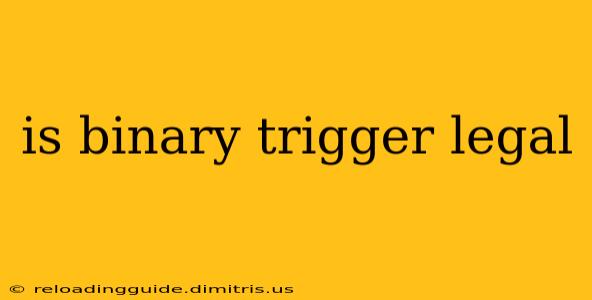Is a Binary Trigger Legal? A Comprehensive Guide to Legality and Restrictions
The legality of binary triggers is a complex issue that varies significantly depending on your location. There's no single, simple answer to "Is a binary trigger legal?" This guide aims to clarify the legal landscape surrounding these devices and help you understand the factors that determine their legality.
What is a Binary Trigger?
Before diving into the legal aspects, it's crucial to understand what a binary trigger is. A binary trigger is a type of firearm trigger mechanism that fires two rounds with a single pull of the trigger. Unlike standard triggers that fire one round per pull, binary triggers essentially convert semi-automatic firearms into a faster-firing mode. This significantly increases the rate of fire.
Legal Status: The Key Factors
The legality of binary triggers hinges on several interacting factors:
-
Federal Laws (USA): At the federal level in the United States, the legality of binary triggers falls into a grey area. The Bureau of Alcohol, Tobacco, Firearms and Explosives (ATF) has historically classified certain binary triggers as machine guns under the National Firearms Act (NFA), which requires registration and substantial taxation. However, the ATF's stance has evolved, and their classification often depends on the specific design and functionality of the trigger. This ambiguity leads to ongoing legal challenges and varying interpretations.
-
State Laws (USA): State laws play a crucial role. Many states have their own regulations regarding firearms and accessories, which can be stricter than federal laws. Some states explicitly ban binary triggers, while others may have ambiguous or undefined regulations. It is absolutely essential to check the specific laws of your state before purchasing or possessing a binary trigger.
-
Specific Design and Functionality: The ATF's classification often depends on the precise mechanical operation of the binary trigger. Triggers designed to function solely as a two-round burst with a single pull might be treated differently than those allowing for fully automatic fire. Subtle differences in design can have significant legal implications.
-
Intended Use: While not always explicitly stated in the law, the intended use of the binary trigger can influence its legal status. Using a binary trigger in a way that violates state or federal law (e.g., discharging a firearm in a prohibited area) could lead to legal repercussions, regardless of the trigger's inherent legality.
Navigating the Legal Maze: Recommendations
Given the complexity and variability of the legal landscape:
-
Consult Legal Counsel: This is paramount. A firearms attorney specializing in NFA regulations can provide the most accurate and up-to-date information regarding the legality of binary triggers in your specific jurisdiction and under your specific circumstances.
-
Thorough Research: Independently research your state and local laws concerning firearms and modifications. Look for official government publications and legal codes.
-
Stay Updated: Firearms laws are frequently amended and interpreted differently over time. Stay informed about changes in regulations through reputable sources.
-
Responsible Gun Ownership: Even if a binary trigger is legal where you reside, responsible gun ownership necessitates adhering to all safety guidelines and applicable laws. Improper handling or use can lead to severe legal consequences.
Disclaimer: This information is for educational purposes only and does not constitute legal advice. The legality of binary triggers is highly dependent on specific circumstances and is subject to change. Always consult with a qualified legal professional before purchasing or possessing any firearm modification.

